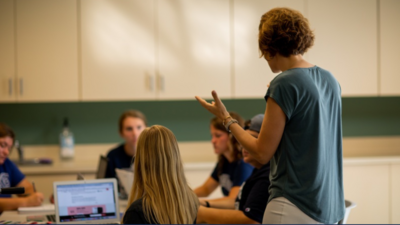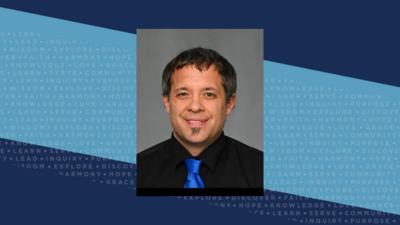10 Reasons to Major in Secondary Education

Secondary education is most often defined as the level of teaching that specializes in the education of students in grades 7-12. Students who choose to major in secondary education as undergraduates can instruct students in junior high or high school in public and parochial or non-parochial private schools.
At Concordia, secondary education students have the opportunity to take a wide variety of education-related courses as well as courses in a more specialized subject – or subjects – of their choosing. Secondary education is a rewarding major that can fit the goals of many undergraduate students; therefore, here are some of the most significant reasons why prospective students should consider a career as a secondary educator.
Opportunities for Specialization
Both in college and beyond, secondary education students have opportunities for specialization that exceed those of most other education majors. At Concordia, these areas include subjects from agriculture to physical education, Spanish, and more. Being able to specialize in a particular subject area allows students not only to gain skills in the education of pre-teens and teenagers but also to gain knowledge about topics that interest them. Therefore, students with a passion for education and other subjects may find their calling in this area.
Working with Older Students
Within the field of education, individual teachers have unique skill sets and talents that may make them more comfortable with certain subjects, school sizes, or age groups. Some undergraduate students may prefer the idea of working with older students over younger ones. The reasons for this vary, but it is fortunate that secondary education majors can specialize not only in one or more subject areas but also in teaching children no younger than middle schoolers! As a secondary educator, you would be able to find work in middle schools, high schools, or K-8 schools, most often teaching students in grades 7-12.
Helping Kids Discover Their Passions
From the time they start junior high, children only become more interested in the question of “what do you want to do when you grow up?” By the time they start high school, many will think seriously about this question and even choose to take classes that will help them reach their future goals. As a secondary educator, you can help older students give a confident answer to this question. Your class could be the class in which a student discovers their academic passion, whether it be art, literature, biology, math, or something else.
School Schedule
If you want a summer break and weekends off, secondary education might be the field for you! All joking aside, however; educators operate on a school schedule, just like students do. Consequently, this also includes homework, although your “homework” as an educator will likely look more like grading papers. But if you enjoy having time to interact with younger members of society and time to yourself, working in education can give you that ability. In addition, educators who are also parents often have the same or similar schedules to their children.
Job Security
Secondary educators are always in demand. The American population is always growing, and the constant supply of children and adolescents keeps the school system “in business.” According to Grace College, 88% of the members of Generation Z who have graduated from college say that they chose a major with job security in mind. The secondary education major is one of these: the National Education Association finds that teaching is one of the professions with the highest-rated job security, at 4.4 out of 5.0 points.
Different Careers/Advancement Opportunities in the Education System
Being a teacher isn’t the only career option for secondary education majors. After earning a graduate degree, such as a master’s, secondary educators can branch out to different jobs and roles, such as instructional technology, guidance or school counseling, educational administration, or special education. Even teachers who desire career advancement later in life can pursue further education or certification and choose to enter a new role.
Undergraduate Field Experiences
At Concordia, secondary education students can experience education before they begin working professionally. A “professional semester” composed of both local and non-local student teaching requirements allows prospective teachers to gain hands-on experience in the field as undergraduates. In addition, mission and volunteer opportunities, part-time jobs, and other required field experience can give students a sense of what their role as a future secondary educator will look like, before they even graduate!
Lutheran-Specific Opportunities
In addition to the general benefits of working in education, students who major in secondary education at a Lutheran institution have even greater opportunities awaiting them, before and after graduation. One option for all education majors at Concordia is the Lutheran Teacher Diploma (LTD), a certification that allows them to become commissioned church workers in the Lutheran Church – Missouri Synod. LCMS-sponsored mission opportunities are another option for secondary education students, especially those who are interested in teaching non-English speakers or teaching abroad.
Personal Fulfillment and Job Satisfaction
While working as an educator can certainly have its challenges, the field allows its members to experience a uniquely satisfying line of work. According to Teachers of Tomorrow, educators influence around 3,000 students over the course of their career. In addition, they can create community among their students as well as coworkers, district schools, and beyond. Teachers are continuously learning, not only about the subject they teach, but also about the world, the characteristics of young people, and how to improve their practices. Secondary educators are uniquely able to watch their students transition into a new stage of life as they graduate middle school or high school and are faced with new challenges and joys.
Education is a field that is always changing and growing, where no two days of work are the same. At the secondary level, it provides its members with job security and satisfaction, advancement and specialization opportunities, and, most significantly, a lifetime of visible impact on students. If you are considering pursuing a degree in education, secondary education could be the perfect place for your talents.
Interested in Concordia’s secondary education program? Learn more here.
Related Stories


